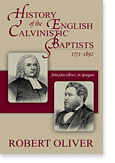History of the English Calvinistic Baptists
 Last week I picked up one of Banner of Truth’s latest releases called History of the English Calvinistic Baptists: 1771-1892 by Robert W. Oliver. After perusing through some of the book, I think this book will be really helpful to navigate through some of the controversies and developments during that time period. The front flyleaf explains the book this way:
Last week I picked up one of Banner of Truth’s latest releases called History of the English Calvinistic Baptists: 1771-1892 by Robert W. Oliver. After perusing through some of the book, I think this book will be really helpful to navigate through some of the controversies and developments during that time period. The front flyleaf explains the book this way:
The aim of this book is to trace the story of the English Calvinistic Baptists from the death of John Gill in 1771 to that of Charles Haddon Spurgeon in 1892. It deals not only with the well-known figures in this community’s history—theological giants like John Gill, Andrew Fuller, William Gadsby, and Charles Spurgeon—but also with lesser-known lights—men like the hymn writer Benjamin Beddome, the eccentric John Collett Ryland, Abraham Booth, and John Stevens. Wide and deep reading into the writings of these men has given Dr. Robert Oliver an excellent grasp of their various theological perspectives.
No Christian community is without its controversies, and the Calvinistic Baptists in the period covered by this book are no exception. Even-handedly and with one eye always on the Calvinistic Baptist roots in the seventeenth century—well summed up by The Second London Confession of Faith (1689)—the author details the controversies that at times wracked this community. Who may take the Lord’s Supper? What is the role of the law in the Christian life? Is there biblical warrant for making free offers of the gospel to all and sundry? None of these issues are minor matters and should not be ignored by Christians today. The thinking of these Baptist worthies is therefore still of great value.
Unlike some contemporary historians, Robert Oliver is rightly convinced that the development of the Strict and Particular strand of this community in the nineteenth century is not a stagnant backwater that is best forgotten. Even though the churches of this persuasion were not as balanced as their seventeenth and eighteenth-century forebears, there was a spiritual vitality to this group that needs remembering, and Oliver has given us a rich overview of the thought and activities of these English Calvinistic Baptists.
I have not had the time to read this book yet, but I have looked through the front and back matter. The appendices and especially the bibliography is well worth checking out as Oliver has provide a wealth of resources for further study. After having studied seventeenth century English Puritanism and the foundation of the Particular Baptist movement, I look forward to having a better of standing of future generations of such Baptists, how they thought and how they handled the issues in their day.
I encourage you, if you are interested in getting a better grasp of Baptist history (and in particular the roots of Calvinism in Baptist history), I encourage you to get this book. You can purchase it at Banner of Truth’s website, or if you are in



0 Comments:
Post a Comment
<< Home